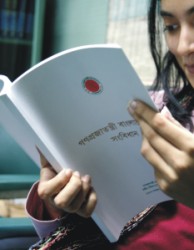|
Special Feature

Nader Rahman
 |
Tanbir Siddiqui |
On the 23rd of July 2006 the government of Bangladesh took out a caution notice for the first time in the history of Bangladesh in different national daily newspapers. The message it gave out was unsurprising, that people who falsely reprinted the constitution would be taken to task. They could face both jail time and extensive monetary fines up to Tk. 2 lakh. But something was added in that notice that till then had never been seen or heard of before. In no uncertain terms they stated that the copyright of the constitution lay with the government (Ministry of Law, Justice and Parliamentary Affairs as per schedule 1 of the rules of business) and under section 82 of the Copyright Law 2000. Just to be clear, the government claimed that they alone held the copyright for the constitution. The highest law of the republic and the home of our fundamental rights was seemingly now the government's property. To say that was scandalous would be severely downplaying the incident, but then again in a country where our national history changes every five years, this was not particularly a major event. But how did it get to this situation? Possibly the person who seems best fit to answer that question is a gentleman who has spent his career trying to spread the knowledge of the constitution, only to be continually stonewalled by successive governments. Tanbir Siddiqui is a human rights activist and an expert on all things constitutional, his organisation Change Makers, a human rights and civic education organisation, has been heavily involved in the teaching of the constitution. “The government notice on the constitution proved that there was demand for it" he says . "A few unscrupulous businessmen reprinted the constitution using the government logo and format, which was widely known to everybody particularly to the ministry people, for them many people had to suffer. Their malpractice led to the notice, which in turn proved to be explosive. The government got themselves all tangled up by saying that they owned the copyright of the constitution, which was wholly incorrect and could be challenged by any citizen of the country. How can the constitution be under any copyright? What are the arguments behind this? If our fundamental rights as citizens are stated there, is it possible to say that one has copyright over that!”
 The topic gets him quite worked up for a number of reasons, his organisation Change Makers actively went out into rural Bangladesh and taught high school children about the constitution along with other issues under their civic education programme, yet he faced massive problems with handing out copies of the document itself. Truth be told he could never get copies to hand out, the government would never give him any copies because they only printed it once in a few years. That in itself is rather shocking that governments' only print the constitution every few years, don't they realise that every citizen should be entitled to a copy, if needed? With that in mind after being sent away empty handed on numerous occasions, Siddiqui finally asked the government for permission to reprint the constitution from his organisation for educational purposes; he stated specifically that they would not be sold for profit. He was denied by the government, denied what he and many others believed to be one of their fundamental rights. The topic gets him quite worked up for a number of reasons, his organisation Change Makers actively went out into rural Bangladesh and taught high school children about the constitution along with other issues under their civic education programme, yet he faced massive problems with handing out copies of the document itself. Truth be told he could never get copies to hand out, the government would never give him any copies because they only printed it once in a few years. That in itself is rather shocking that governments' only print the constitution every few years, don't they realise that every citizen should be entitled to a copy, if needed? With that in mind after being sent away empty handed on numerous occasions, Siddiqui finally asked the government for permission to reprint the constitution from his organisation for educational purposes; he stated specifically that they would not be sold for profit. He was denied by the government, denied what he and many others believed to be one of their fundamental rights.
There are many theories as to why the constitution was never really widely available; the answer that seems simplest is that successive governments have never wanted the people to truly know what their rights were, and what the supreme laws of the land were. It seems utterly plausible in a country like ours where the politicians feed off the public's lack of knowledge. As Siddiqui says “The constitution is the ultimate source of knowledge for a conscious citizen”.
But there may also be more sinister reasons behind its lack of circulation. In the past 30 years our nation's history has been changed several times and the constitution has been used as one of the major history changing tools. In 1998 the government in power reprinted the constitution, with a preface and many appendices for the first time (preface and these appendices are not part of the constitution) such as Proclamation of Independence, The Laws Continuance Enforcement Order, 1971, the Provisional Constitution of Bangladesh Order, 1972. These additions to the constitution would lead to many others in the future. Firstly there was absolutely no need for a preface to printed. The preface itself created a storm as it stated that Bangabandhu declared independence, whether he did or not is not the point but why was such an obviously unnecessary and biased preface included with the constitution? As if to prove their point that government included appendices such as Bangabandhu's declaration of independence speech. It was the largest constitution ever printed in Bangladesh, truly an epic.
In late October 2006 (though August was mentioned on the constitution as the time of publication) the previous government had to reprint the constitution for the first and only time during their tenure; interestingly enough it was a few days before they were to leave office. They went about their history shaping by writing a 'completely new preface' where the late Ziaur Rahman declared Bangladesh's independence, without mentioning a specific date. The only good thing they did achieve was that they left out all the previously incorporated appendices, but no doubt even that was done for their own selfish purposes, as the appendices included in the 1998 version only backed up the thought that Bangabandhu actually declared Independence. Soon after the newest version was printed, a Judicial Inquiry was ordered by the Metropolitan magistrate court on November 10, 2006 against the immediate past Law Minster Moudud Ahmed on charges that he changed the history of the nation. Many media outlets stated that he changed the preface of the constitution (which is not a part of the constitution).
Where does one go from here? Two political parties have used the constitution as their own private battlefield while the rest of the nation is still trying to get hold of a copy. People like Tanbir Siddiqui have had to bear the brunt of it. The immediate past government printed the constitution once, and that too, mere days before they left office. As a result, the 14th amendment which was passed in 2004 was only added and printed in constitution in October 2006! For two years the country had an amendment finally which was never published by the government. Tragically the distribution of the newly published constitution was suspended as the former law minister Abdul Matin Khasru demanded removal of the newly written preface and suspension of distribution.
While they have the audacity to send out a caution notice against people who have illegally printed the constitution, another question is still unresolved; what will happen to them who applied to the ministry and sought permission to print the constitution on their own for educational purpose, not for sale or profit? What they should have done is pin a medal on them instead of threatening them. At least they tried to inform the public about what was going on, while the government waged its private battle over the 'real' history of the country. As Tanbir Siddiqui says “The constitution belongs to everyone, all we are saying is give it back to them.” Copyright
(R) thedailystar.net 2007 |
